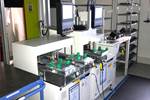Sirius Aviation debuts hydrogen-powered business jets
More eco-friendly private air travel with modern luxury options is offered through the Sirius CEO-Jet and Adventure Jet, collaboratively developed with BMW Group.
Source | Sirius Aviation AG
On June 24, (Zurich, Switzerland) unveiled two hydrogen-powered luxury business jets, the Sirius CEO-Jet and the Sirius Adventure Jet. Developed in collaboration with (Munich, Germany), these aircraft aim to transform private air travel with eco-friendly alternatives, substantially reducing CO2 emissions. While materials haven’t been confirmed, it is likely fiber-reinforced composite materials play a role in these aircraft structures, as they do for the Sirius Jet hydrogen-powered vertical takeoff and landing (VTOL) aircraft.
“The CEO-Jet offers an eco-friendly option for business travel, while the Adventure Jet opens new horizons for global tourism and exploration,” says Alexey Popov, Sirius Aviation AG CEO.
Combining sustainable business aviation with modern luxury, the hydrogen-powered CEO-Jet uses a hydrogen-electric powertrain for zero carbon emissions. It cruises at speeds up to 323 knots, has a range of up to 1,150 miles and seats three passengers. The interior offers extensive customization options such as colors, upholstery, amenities and bespoke bathrooms, catering to discerning travelers.
The Adventure Jet is designed for leisure and adventurous pursuits, also featuring a hydrogen-electric powertrain for sustainable travel. It has a range of up to 1,150 miles, speeds reaching 323 knots and accommodates five passengers. With an exploration-ready design, it reportedly provides seamless access to uncharted territories and offers customizable interiors.
Related Content
-
Development of a composite liquid hydrogen tank for commercial aircraft
Netherlands consortium advances cryogenic composites testing, tank designs and manufacturing including AFP, hybrid winding, welding of tank components and integrated SHM and H2 sensors for demonstrators in 2025.
-
Forvia moves toward more sustainable automotive composites manufacturing
Automotive technology supplier Forvia shares sustainability goals and recent developments aimed at bio-based and recycled materials and ramping up hydrogen tank production for clean mobility.
-
Polar Technology develops innovative solutions for hydrogen storage
Conformable “Hydrogen in a Box” prototype for compressed gas storage has been tested to 350 and 700 bar, liquid hydrogen storage is being evaluated.



